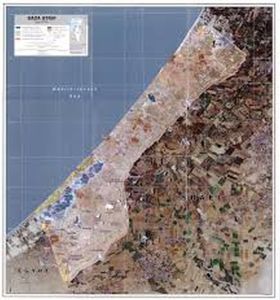“Coupled with the fatalism that life in Gaza under Hamas generates, this is a natural proving ground for the use of a comfort zone.”
 Kibbutz Nirim, Israel, May 6 – Israeli efforts to prevent the infiltration of Palestinian fighters from the Gaza Strip intensified Wednesday with the creation of a comfort zone surrounding the coastal territory.
Kibbutz Nirim, Israel, May 6 – Israeli efforts to prevent the infiltration of Palestinian fighters from the Gaza Strip intensified Wednesday with the creation of a comfort zone surrounding the coastal territory.
Residents of communities in the Gaza Belt region reported military activity in areas abutting the border fence, and an IDF spokesman confirmed that the army had established a comfort zone to help curb or eliminate attempts by terrorists to cross into Israel. As such, said the spokesman, residents of the Gaza Strip would now feel secure only when still ensconced in its familiar environs, and militants would therefore be that much less likely to try digging tunnels or swimming into Israel to kidnap and murder.
Infiltration has become a major concern for Gaza Belt residents and the military alike. Tunnels extending for hundreds of meters into Israel were discovered before and during the conflict with Hamas last summer, and although no civilian casualties resulted from several Hamas attacks using those passages, they have had a pasting psychological impact on inhabitants of the communities surrounding Gaza and on military planning. Hamas also made at least one attempt to attack with frogmen from the Mediterranean. While the IDF assures citizens it is prepared to counter the infiltration threat, military and local leaders agree a preventive, rather than deterrent, measure will be more effective in combating the menace.
“An ounce of prevention,” said IDF spokesman Colonel Peter Lerner. “It is obviously wiser to make defensive operations unnecessary by neutralizing the threat before it can get off the ground. That is why we have established a comfort zone around Gaza. Comparatively few people will venture outside a comfort zone, which means that in imposing it we have automatically reduced the pool of Palestinian infiltrators by a significant number.” He declined to give specific figures, saying he was not at liberty to reveal the exact numbers or how the IDF arrived at them.
Col. Lerner said the Gaza Comfort Zone creates a sense of serenity in routine so intense that the mere prospect of disrupting it causes severe anxiety. “Coupled with the fatalism that life in Gaza under Hamas generates, this is a natural proving ground for the use of a comfort zone,” he explained.
If successful, the comfort zone strategy might be expanded to the West Bank, where a lower level of threat to Israel exists in the immediate term, but where Hamas’s power has been growing. The utility of a comfort zone along other fronts such as Lebanon and Syria might prove more challenging, however, as those societies live in a perpetual political, military, economic, and demographic whirlwind that defies the very concept of a comfort zone.




